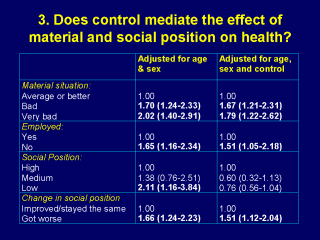| front |1 |2 |3 |4 |5 |6 |7 |8 |9 |10 |11 |12 |13 |14 |15 |16 |17 |18 |19 |review |
 |
To look at the impact of control and
whether it mediated the impact of material and social position on health we first explored
whether feelings of low control over ones life were more common amongst the more deprived.
We found that feelings of low control were more common amongst the deprived groups as
measured using both social and poor material status (data not shown). We then explored whether control accounted for the impact of material and social position on health as shown in the table: By adding control to the model we can see whether odds ratios change – if they do, it suggests that the change was due to control: Can see that the main change is in the odds ratio for social position, which declines from 2.11 to 0.76 in those with low social position. This suggests that the negative impact of low social position on health is accounted for by low levels of control. Control does not however explain (to any great extent) the impact of poor economic position on health. We have already seen that the impact of control on health is independent of other factors including material status. Thus control is important in own right and in explaining impact of social position on health. |